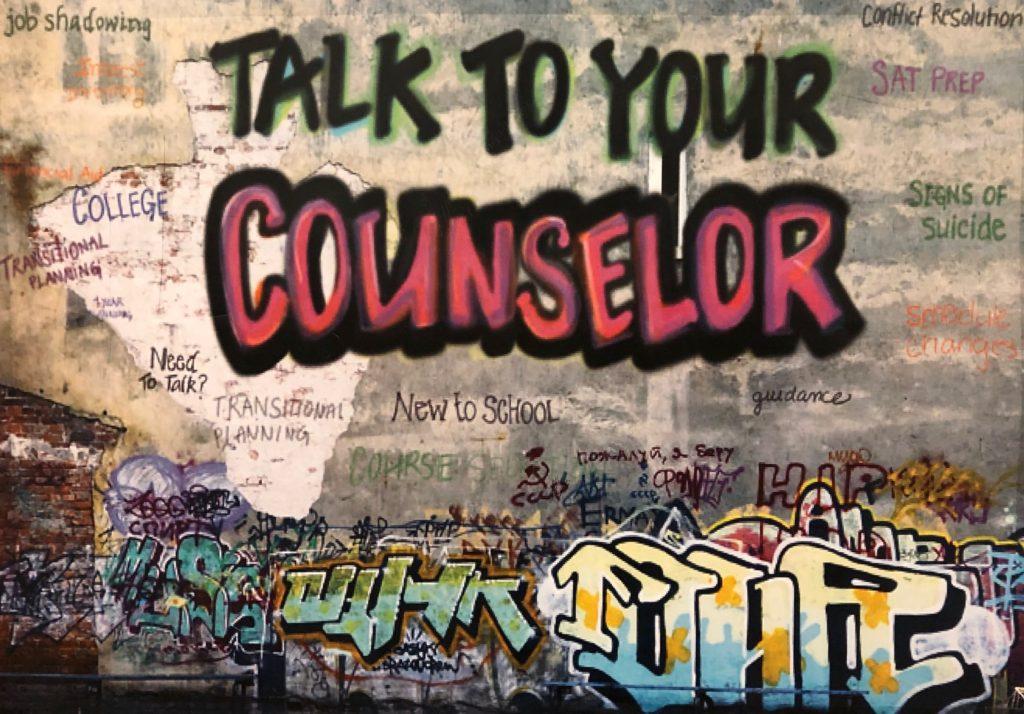Simplifying the college search
A grafitti-styled painting on the wall outside Manual’s guidance office reminding students to “Talk to your counselor.”
March 4, 2021
It always seems to be that time of the year for high schoolers; the inevitable, relentless, lurking cloud pestering “what’s next in your life.” So, what do you want to major in? What colleges are you looking at? Do you want to go to a trade school instead? How about the military? What will it be, what will you do?
It’s easy to push off these decisions and procrastinate in the name of being too young, too busy or too overwhelmed. However, regardless of whether you agree with the immense pressures society puts on students or the sometimes toxic scholar culture, it’s a good idea to start looking at your options and get a feel for what’s to come. Everyone has to leave high school at some point— whatever way, shape or form that may take on— and become a contributing adult member of society.
No one is saying you have to come up with a definite college list as a freshman or have a perfect outline of what you’re going to do after graduation. People change and so does the world. Appreciate the time you have before having to begin worrying about taxes or pretending like you know what you should be doing. Don’t spend all of the present stressing about the future, but don’t fully neglect it either.
Let your plan for continuing education be as simple, easy and smooth as possible by alloting plenty of time and organizational methods into the process.
Pick your search tactics
If you haven’t already, take a few minutes to reach out to your counselor and introduce yourself. It’s beneficial to have a relationship with your guidance counselor, whether for future references or being comfortable in asking about everyday needs. This is the person you can trust to help you with any college, trade school or other life questions. Visit their website here.
After establishing a connection with your counselor and perhaps talking with them for a while, go ahead and choose a couple college/trade school search methods. This is how you’ll begin compiling your list of possibilities.
Free and credible websites that carry a wide range of information include Niche, CollegeBoard and U.S. News. They allow you to compile online college lists and tailor searches to your preferences. Begin to ask yourself what exactly your preferences are. Would you like to stay in state? Do you do better in smaller class sizes or smaller campuses? Consider these sorts of points during your search process.
If you’re dead-set on a particular major or pathway, such as nursing or education, there are some extra steps you can take. Compare the curriculum between prospective schools and see which ones are more credible or don’t require you to take as many unnecessary, additional courses (in other words, colleges who try to squeeze you of money and time). Not all majors are created equally across all colleges. For example, a nursing degree at one college may seem like a great choice; but, when stacked up against tons of other colleges, you may realize that many of the required courses appear unnecessary or aren’t as studious. Again, this is another area where talking with your guidance counselor can come in handy.
Make a spreadsheet
Create a spreadsheet with prospective colleges, their locations, net cost and other key elements you’d like to prioritize. This is the place where you can easily compare what colleges will give you more money, credits from high school classes or see the better fit.
It may also be beneficial to create columns for the merit, diversity and other scholarships a certain college would give you. This way, if money is a contributing factor, the information is all in one place and the system can total everything up.
Let the spreadsheet guide you as an organizational tool and not as an obsessional method.
Schedule visits
Once you’ve narrowed down your list a bit, start looking to schedule in person visits or attend virtual tours. This way you get to see the campus, get a feel of the atmosphere and ask plenty of questions.
Additional considerations
Most students typically get serious about their college search during junior year, especially since that’s when you’ll be expected to take big tests such as the PSAT, ACT or SAT. Reality kind of hits you in the face after all that testing.
Juniors can check out Manual’s Junior check list for some extra preparation points. If you haven’t already, schedule college visits, reach out to admissions teams and start narrowing down your list. Most students end up with around five to eight colleges on their final list, although it varies.
Seniors can help alleviate stress or anxiety by starting early on the application process. This is the year to fill out the Common App, ask for recommendation letters, file your FAFSA and KHEAA account, apply for scholarships and account for any other supplemental information or essays.
This may sound like a lot at first, but it actually isn’t as scary at a second glance. Rely on a detailed checklist with deadlines and set reminders to help you keep focused and reduce any overwhelming emotions you may have. Your guidance counselor will also provide you with information about what you need to do to prepare, so don’t worry that you’re in this alone.
Your counselor, teachers and support system of friends and family will not let you get lost in the vast expanse of hectic happenings. Take things one step at a time and remember that it’s just a to-do list, and you can do it.









